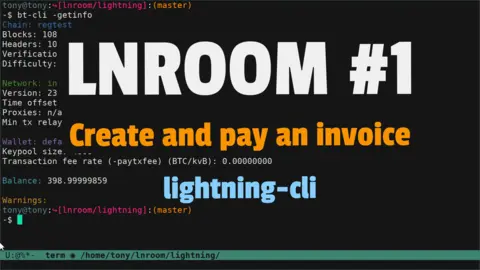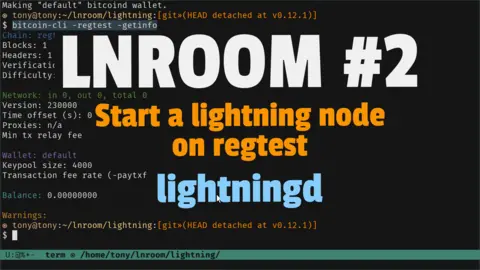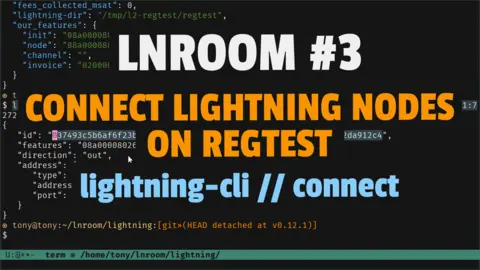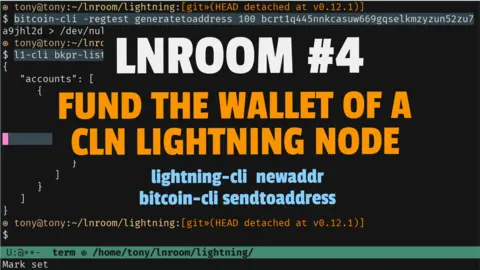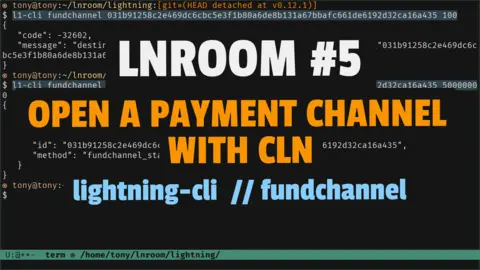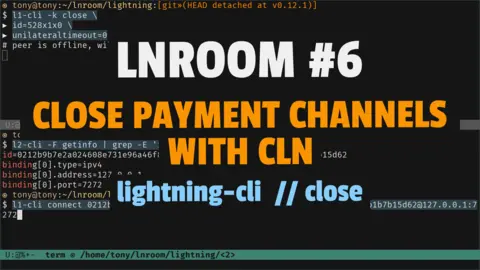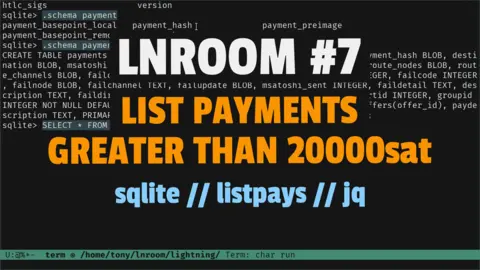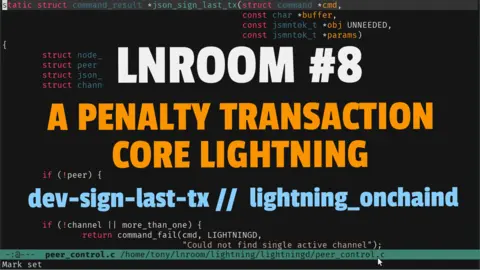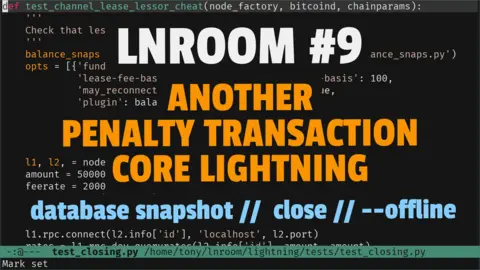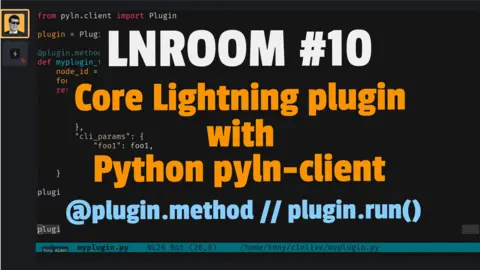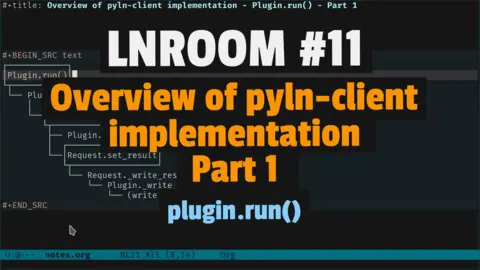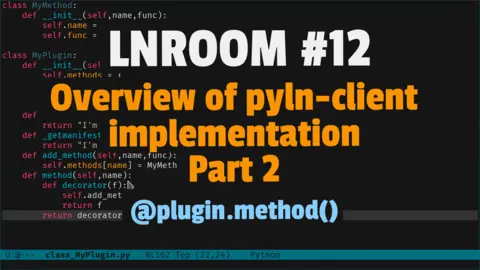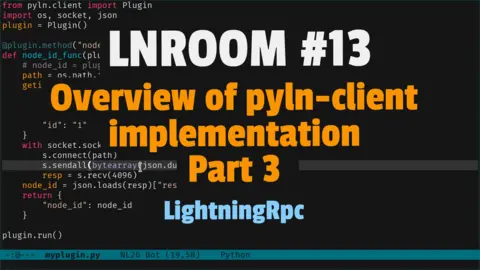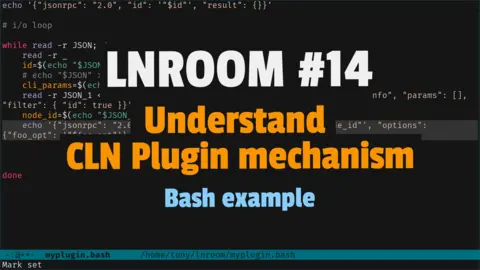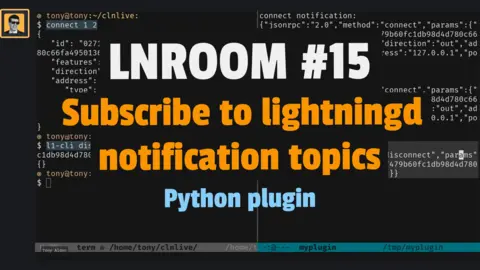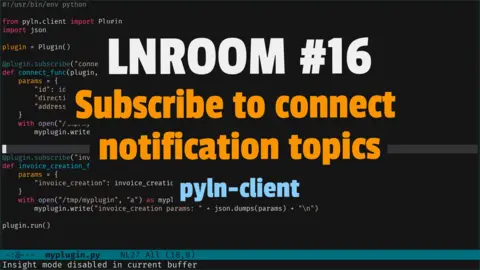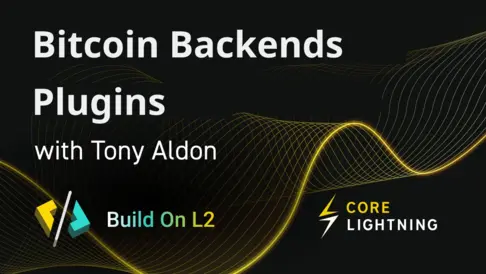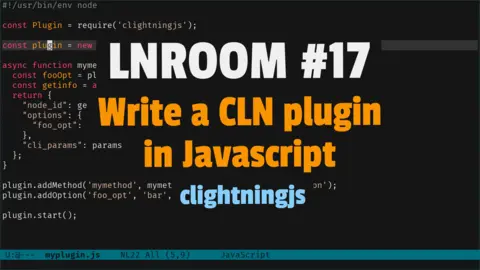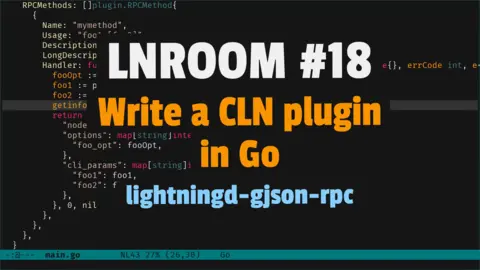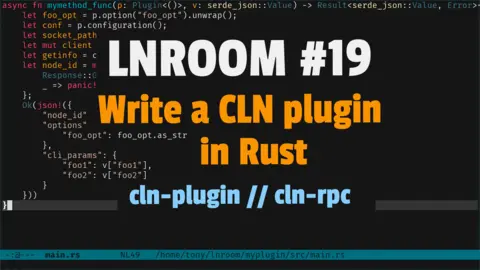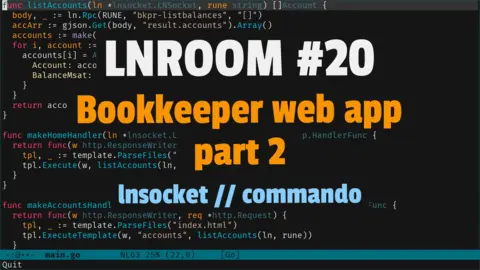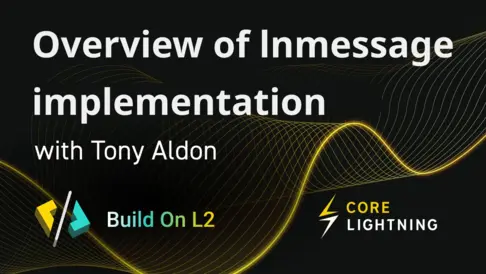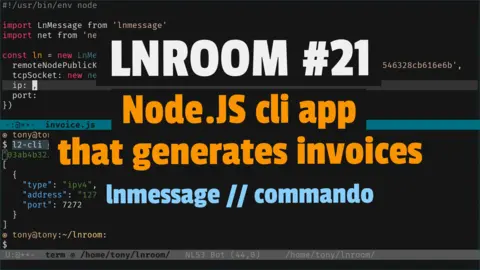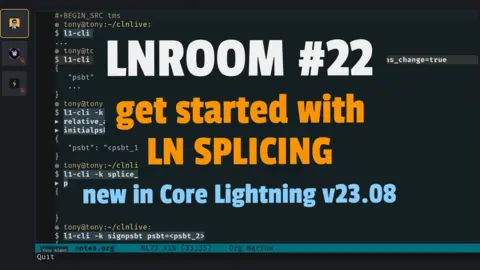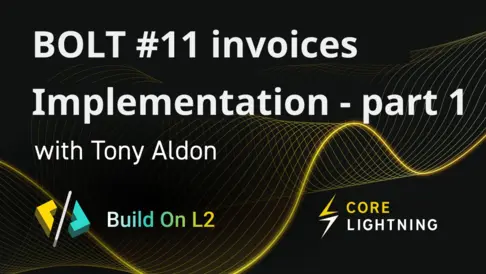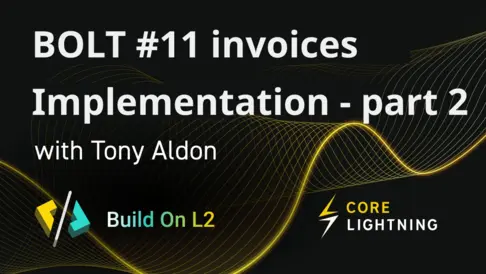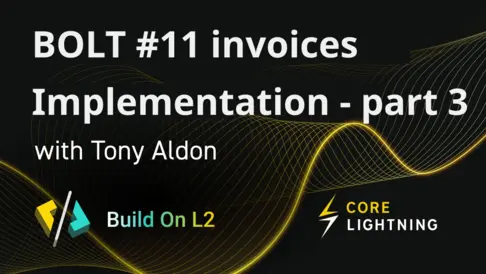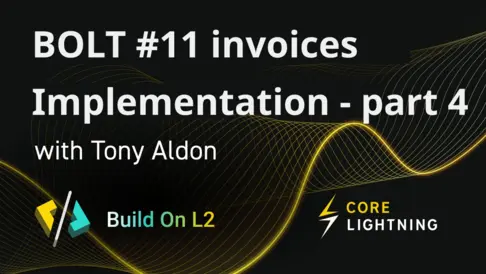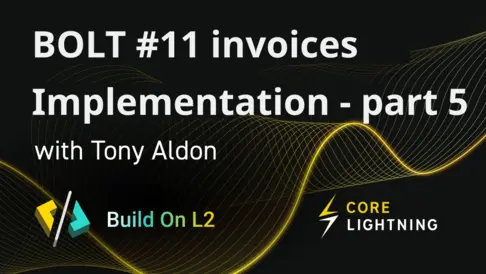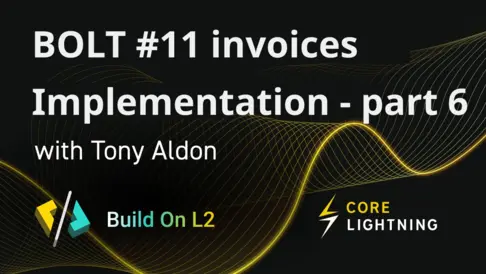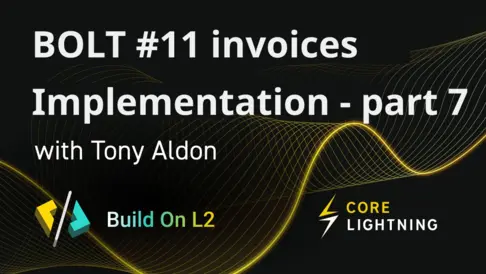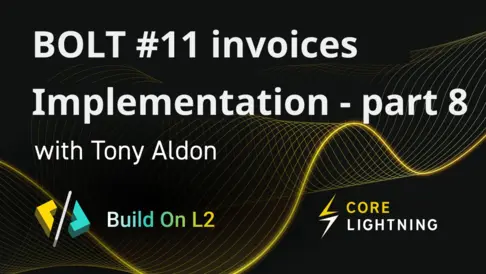Write a Core Lightning plugin in Go
In this episode, we write a Core Lightning plugin in go that registers a JSON-RPC method. To do so we use lightningd-gjson-rpc Go module.
Transcript with corrections and improvements
Let's add the method mymethod to CLN by writing a dynamic
Go plugin called myplugin using lightningd-gjson-rpc.
When we start the plugin myplugin with the option foo_opt set to
BAR like this
◉ tony@tony:~/lnroom:
$ l1-cli -k plugin subcommand=start plugin=$(pwd)/myplugin foo_opt=BARwhere l1-cli is an alias for lightning-cli
--lightning-dir=/tmp/l1-regtest, we expect mymethod method called with
the parameters foo1=bar1 and foo2=bar2 to gives us the following
◉ tony@tony:~/lnroom:
$ l1-cli -k mymethod foo1=bar1 foo2=bar2
{
"node_id": "029999ce6a1b74cf077f503b81bb4d95af34114363bdac5922a9b353ce0449bac4",
"options": {
"foo_opt": "BAR"
},
"cli_params": {
"foo1": "bar1",
"foo2": "bar2"
}
}where the value of node_id is the ID of the node l1.
Core Lightning plugin system
Before implementing that plugin, let's describe Core Lightning plugin system.
Once lightningd has started the plugin as a subprocess, the plugin and
lightningd communicate using pipes. Specifically,
lightningdwrites to the stdin stream of the plugin to send it messages andthe plugin writes to its stdout stream to send messages to
lightningd.
To understand each other they use the JSON-RPC protocol.
That communcation can be represented like this:
-> stdin
| |
lightningd plugin
| |
<- stdoutNow that we know how lightningd and plugins communicate with each
other, let's take a look at the life cycle of a plugin like
myplugin which registers a JSON-RPC method called mymethod:
When
lightningdstartsmyplugin, it sends thegetmanifestrequest tomyplugin.mypluginreplies tolightningdwith a response containing the declaration of the startup optionfoo_optand the information to registermymethodJSON-RPC method.Then
lightningdsends theinitrequest tomyplugin. This tellsmypluginthatlightningdis ready to communicate. Thatinitrequest contains informations that the plugin might needs to work correctly. For instance,mypluginneeds to know the value of the startup optionfoo_optand to know the Unix socket file to use to connect to the node and to send JSON-RPC requests in order to retrieve the node id. Those informations are available in theinitrequest.Then
mypluginstarts an IO loop and waits in its stdin stream incoming requests fromlightningd:(a). A client sends a
mymethodrequest tolightningd. Asmypluginhas registeredmymethodJSON-RPC method tolightningd,lightningdforwards that request tomyplugin,(b).
mypluginreceives that request, builds a response and sends it back tolightningd,(c). Finally,
lightningdforwards that response to the client,(d). We repeat (a) to (c).
Setup
Here is my setup:
lightningd v23.05.2
go 1.9
lightningd-gjson-rpc v1.6.2
Ubuntu 22.04.2 LTSStart 2 Lightning nodes running on regtest
Let's start two Lightning nodes running on the Bitcoin regtest chain
by sourcing the script lightning/contrib/startup_regtest.sh provided
in CLN repository and by running the command start_ln:
◉ tony@tony:~/lnroom:
$ source lightning/contrib/startup_regtest.sh
...
◉ tony@tony:~/lnroom:
$ start_ln
...We can check that l1-cli is just an alias for lightning-cli with the
base directory being /tmp/l1-regtest:
◉ tony@tony:~/lnroom:
$ alias l1-cli
alias l1-cli='lightning-cli --lightning-dir=/tmp/l1-regtest'Installing and using lightningd-gjson-rpc
In the file main.go, first we import the module
lightningd-gjson-rpc/plugin. Then in the main function we define
p a dynamic plugin of type plugin.Plugin. Finally, at the end of the
main function we start the I/O loop with p.Run():
package main
import "github.com/fiatjaf/lightningd-gjson-rpc/plugin"
func main() {
p := plugin.Plugin{
Dynamic: true,
}
p.Run()
}This defines a CLN plugin (thought it does nothing).
Let's create go.mod and go.sum files (which also downloads the
dependencies - they are already present on my machine) like this:
◉ tony@tony:~/lnroom:
$ go mod init myplugin
go: creating new go.mod: module myplugin
go: to add module requirements and sums:
go mod tidy
◉ tony@tony:~/lnroom:
$ go mod tidy
go: finding module for package github.com/fiatjaf/lightningd-gjson-rpc/plugin
go: found github.com/fiatjaf/lightningd-gjson-rpc/plugin in github.com/fiatjaf/lightningd-gjson-rpc v1.6.2Now we compile main.go into myplugin binary:
◉ tony@tony:~/lnroom:
$ go build -o mypluginWe can now start the myplugin plugin:
◉ tony@tony:~/lnroom:
$ l1-cli plugin start $(pwd)/myplugin
2023-07-13T17:51:33.905Z plugin- initialized plugin
{
"command": "start",
"plugins": [
{
"name": "/usr/local/libexec/c-lightning/plugins/autoclean",
"active": true,
"dynamic": false
},
{
"name": "/usr/local/libexec/c-lightning/plugins/chanbackup",
"active": true,
"dynamic": false
},
{
"name": "/usr/local/libexec/c-lightning/plugins/bcli",
"active": true,
"dynamic": false
},
{
"name": "/usr/local/libexec/c-lightning/plugins/commando",
"active": true,
"dynamic": false
},
{
"name": "/usr/local/libexec/c-lightning/plugins/funder",
"active": true,
"dynamic": true
},
{
"name": "/usr/local/libexec/c-lightning/plugins/topology",
"active": true,
"dynamic": false
},
{
"name": "/usr/local/libexec/c-lightning/plugins/keysend",
"active": true,
"dynamic": false
},
{
"name": "/usr/local/libexec/c-lightning/plugins/offers",
"active": true,
"dynamic": true
},
{
"name": "/usr/local/libexec/c-lightning/plugins/pay",
"active": true,
"dynamic": true
},
{
"name": "/usr/local/libexec/c-lightning/plugins/txprepare",
"active": true,
"dynamic": true
},
{
"name": "/usr/local/libexec/c-lightning/plugins/spenderp",
"active": true,
"dynamic": false
},
{
"name": "/usr/local/libexec/c-lightning/plugins/sql",
"active": true,
"dynamic": true
},
{
"name": "/usr/local/libexec/c-lightning/plugins/bookkeeper",
"active": true,
"dynamic": false
},
{
"name": "/home/tony/lnroom/myplugin",
"active": true,
"dynamic": true
}
]
}Although our plugin doesn't do anything, we can check that it's running.
◉ tony@tony:~/lnroom:
$ ps -ax | rg mypl
110238 pts/1 Sl 0:00 /home/tony/lnroom/myplugin
110258 pts/1 S+ 0:00 rg myplDeclare mymethod JSON-RPC method
Now let's declare mymethod method which always returns the json object
{"foo": "bar"}:
package main
import "github.com/fiatjaf/lightningd-gjson-rpc/plugin"
func main() {
p := plugin.Plugin{
Dynamic: true,
RPCMethods: []plugin.RPCMethod{
{
Name: "mymethod",
Usage: "",
Description: "Description",
LongDescription: "LongDescription",
Handler: func(p *plugin.Plugin, params plugin.Params) (interface{}, int, error){
return map[string]interface{}{
"foo": "bar",
}, 0, nil
},
},
},
}
p.Run()
}Note that in the video, I used (resp interface{}, errCode int, err
error) as returned values of the handler function instead of
(interface{}, int, error).
Let's compile and restart the plugin like this
◉ tony@tony:~/lnroom:
$ go build -o myplugin
◉ tony@tony:~/lnroom:
$ l1-cli plugin start $(pwd)/myplugin
2023-07-13T17:57:55.718Z plugin- initialized plugin
{
"command": "start",
"plugins": [...]
}and call mymethod method by running the following command:
◉ tony@tony:~/lnroom:
$ l1-cli mymethod
{
"foo": "bar"
}Not so bad. We know how to register JSON-RPC commands.
Let's continue.
Add foo_opt startup option to myplugin
We can declare startup options to lightningd using Options field of
the struct plugin.Plugin.
After we receive the init request from lightningd,
lightningd-gjson-rpc takes care to put the startup options we've
declared to lightningd in p.Args.
For instance, we can declare the startup option foo_opt and access
its value in mymethod's handler this way:
package main
import "github.com/fiatjaf/lightningd-gjson-rpc/plugin"
func main() {
p := plugin.Plugin{
Dynamic: true,
Options: []plugin.Option{
{
Name: "foo_opt",
Type: "string",
Default: "bar",
Description: "Description",
},
},
RPCMethods: []plugin.RPCMethod{
{
Name: "mymethod",
Usage: "",
Description: "Description",
LongDescription: "LongDescription",
Handler: func(p *plugin.Plugin, params plugin.Params) (interface{}, int, error){
fooOpt := p.Args.Get("foo_opt").String()
return map[string]interface{}{
"foo_opt": fooOpt,
}, 0, nil
},
},
},
}
p.Run()
}Back to our terminale, we compile the plugin, we restart it and call
mymethod method:
◉ tony@tony:~/lnroom:
$ go build -o myplugin
◉ tony@tony:~/lnroom:
$ l1-cli plugin start $(pwd)/myplugin
2023-07-13T18:02:34.424Z plugin- initialized plugin
{
"command": "start",
"plugins": [...]
}
◉ tony@tony:~/lnroom:
$ l1-cli mymethod
{
"foo_opt": "bar"
}Fine, we got the default value of foo_opt option. Let's see if we can
set foo_opt to BAR. To do this, first we stop the plugin:
◉ tony@tony:~/lnroom:
$ l1-cli plugin stop myplugin
{
"command": "stop",
"result": "Successfully stopped myplugin."
}Then we start the plugin with foo_opt option set to BAR like this:
◉ tony@tony:~/lnroom:
$ l1-cli -k plugin subcommand=start plugin=$(pwd)/myplugin foo_opt=BAR
2023-07-13T18:03:38.548Z plugin- initialized plugin
{
"command": "start",
"plugins": [...]
}Finally, calling mymethod method we check that foo_opt has been set
correctly:
◉ tony@tony:~/lnroom:
$ l1-cli mymethod
{
"foo_opt": "BAR"
}Great! We know how to declare startup options and use them.
Add cli parameters to mymethod
In this part we focus on cli parameters handling.
In the field Usage of a RPCMethod struct we can define:
no parameters (using empty string),
optional parameters (enclosing the name of a parameter with brackets) or
mandatory parameters (put the name with no brackets).
For instance using Usage: "foo1 [foo2]" defined foo1 as mandatory
parameter and foo2 as an optional parameter.
When parameters are passed to the command, they are available in the
handler function via its params argument.
Here the new implemention of our plugin which takes two parameters and returns those parameters:
package main
import "github.com/fiatjaf/lightningd-gjson-rpc/plugin"
func main() {
p := plugin.Plugin{
Dynamic: true,
Options: []plugin.Option{
{
Name: "foo_opt",
Type: "string",
Default: "bar",
Description: "Description",
},
},
RPCMethods: []plugin.RPCMethod{
{
Name: "mymethod",
Usage: "foo1 [foo2]",
Description: "Description",
LongDescription: "LongDescription",
Handler: func(p *plugin.Plugin, params plugin.Params) (interface{}, int, error){
foo1 := params.Get("foo1").String()
foo2 := params.Get("foo2").String()
return map[string]interface{}{
"cli_params": map[string]interface{}{
"foo1": foo1,
"foo2": foo2,
},
}, 0, nil
},
},
},
}
p.Run()
}Let's compile and restart the plugin:
◉ tony@tony:~/lnroom:
$ go build -o myplugin
◉ tony@tony:~/lnroom:
$ l1-cli plugin start $(pwd)/myplugin
2023-07-13T18:07:53.802Z plugin- initialized plugin
{
"command": "start",
"plugins": [...]
}Calling mymethod with no parameters raises an error as we can see
below:
◉ tony@tony:~/lnroom:
$ l1-cli mymethod
2023-07-13T18:08:11.923Z plugin- Error decoding params 'foo1 [foo2]': required parameter foo1 missing.
{
"code": 400,
"message": "Error decoding params: foo1 [foo2]",
"data": null
}Let's call mymethod method with one positional parameter, 2 positional
parameters and 2 key/value parameters:
◉ tony@tony:~/lnroom:
$ l1-cli mymethod bar1
{
"cli_params": {
"foo1": "bar1",
"foo2": ""
}
}
◉ tony@tony:~/lnroom:
$ l1-cli mymethod bar1 bar2
{
"cli_params": {
"foo1": "bar1",
"foo2": "bar2"
}
}
◉ tony@tony:~/lnroom:
$ l1-cli -k mymethod foo1=bar1 foo2=bar2
{
"cli_params": {
"foo1": "bar1",
"foo2": "bar2"
}
}We know how to deal with cli parameters.
Let's continue.
Get the node id of the node l1 running myplugin
Let's see how we can get the node id of l1 node, the node running the
plugin.
We can get that node id by doing a getinfo RPC call to the node.
Indeed, in the I/O loop of our plugin (started with p.Run()) the
plugin first answers to the getmanifest request and then answers to the
init request. Just before sending the init response, lightningd-gjson-rpc
set p.Client field with the struct lightning.Client. This
allows us to do JSON-RPC call to the node running the plugin like
this:
p.Client.Call(...)So to retrieve the node id and return it in the json response, we change our plugin to be this:
package main
import "github.com/fiatjaf/lightningd-gjson-rpc/plugin"
func main() {
p := plugin.Plugin{
Dynamic: true,
Options: []plugin.Option{
{
Name: "foo_opt",
Type: "string",
Default: "bar",
Description: "Description",
},
},
RPCMethods: []plugin.RPCMethod{
{
Name: "mymethod",
Usage: "",
Description: "Description",
LongDescription: "LongDescription",
Handler: func(p *plugin.Plugin, params plugin.Params) (interface{}, int, error){
getinfo, _ := p.Client.Call("getinfo")
return map[string]interface{}{
"node_id": getinfo.Get("id").String(),
}, 0, nil
},
},
},
}
p.Run()
}Back to our terminal, we compile and restart our plugin, and call
mymethod method which returns l1's node id:
$ go build -o myplugin
◉ tony@tony:~/lnroom:
$ l1-cli plugin start $(pwd)/myplugin
2023-07-13T18:13:49.722Z plugin- initialized plugin
{
"command": "start",
"plugins": [...]
}
◉ tony@tony:~/lnroom:
$ l1-cli mymethod
{
"node_id": "03e815a542572d3427cac4270e20f34e47fe4dcde9c214fdf64a44fb2393033841"
}We can check that we got the correct id by calling directly getinfo
method:
◉ tony@tony:~/lnroom:
$ l1-cli getinfo | jq -r .id
03e815a542572d3427cac4270e20f34e47fe4dcde9c214fdf64a44fb2393033841Complete implementation
Now we just have to put all the pieces together like this:
package main
import "github.com/fiatjaf/lightningd-gjson-rpc/plugin"
func main() {
p := plugin.Plugin{
Dynamic: true,
Options: []plugin.Option{
{
Name: "foo_opt",
Type: "string",
Default: "bar",
Description: "Description",
},
},
RPCMethods: []plugin.RPCMethod{
{
Name: "mymethod",
Usage: "foo1 [foo2]",
Description: "Description",
LongDescription: "LongDescription",
Handler: func(p *plugin.Plugin, params plugin.Params) (interface{}, int, error){
fooOpt := p.Args.Get("foo_opt").String()
foo1 := params.Get("foo1").String()
foo2 := params.Get("foo2").String()
getinfo, _ := p.Client.Call("getinfo")
return map[string]interface{}{
"node_id": getinfo.Get("id").String(),
"options": map[string]interface{}{
"foo_opt": fooOpt,
},
"cli_params": map[string]interface{}{
"foo1": foo1,
"foo2": foo2,
},
}, 0, nil
},
},
},
}
p.Run()
}Therefore, after compiling and restarting our plugin with the startup
option foo_opt set to BAR like this
◉ tony@tony:~/lnroom:
$ go build -o myplugin
◉ tony@tony:~/lnroom:
$ l1-cli -k plugin subcommand=start plugin=$(pwd)/myplugin foo_opt=BAR
2023-07-13T18:16:53.479Z plugin- initialized plugin
{
"command": "start",
"plugins": [...]
}and calling mymethod method with key/value pairs foo1=bar1 and
foo2=bar2 we get the following:
◉ tony@tony:~/lnroom:
$ l1-cli -k mymethod foo1=bar1 foo2=bar2
{
"cli_params": {
"foo1": "bar1",
"foo2": "bar2"
},
"node_id": "03e815a542572d3427cac4270e20f34e47fe4dcde9c214fdf64a44fb2393033841",
"options": {
"foo_opt": "BAR"
}
}We are done!
lightningd-gjson-rpc source code
(Note that code from fiatjaf/lightningd-gjson-rpc is licensed under the following MIT license.)
During the demo, we've looked at:
Plugin type defined in lightningd-gjson-rpc:plugin/plugin.go:
type Plugin struct { Client *lightning.Client `json:"-"` Log func(...interface{}) `json:"-"` Logf func(string, ...interface{}) `json:"-"` Name string `json:"-"` Version string `json:"-"` Network string `json:"-"` Options []Option `json:"options"` RPCMethods []RPCMethod `json:"rpcmethods"` Subscriptions []Subscription `json:"subscriptions"` Hooks []Hook `json:"hooks"` Features Features `json:"featurebits"` Dynamic bool `json:"dynamic"` Notifications []NotificationTopic `json:"notifications"` Configuration Params `json:"-"` Args Params `json:"-"` OnInit func(*Plugin) `json:"-"` }RPCMethod type defined in lightningd-gjson-rpc:plugin/plugin.go:
type RPCMethod struct { Name string `json:"name"` Usage string `json:"usage"` Description string `json:"description"` LongDescription string `json:"long_description"` Handler RPCHandler `json:"-"` }RPCHandler function type defined in lightningd-gjson-rpc:plugin/plugin.go:
type RPCHandler func(p *Plugin, params Params) (resp interface{}, errCode int, err error)Params type defined in lightningd-gjson-rpc:plugin/params.go:
type Params map[string]interface{}Option type defined in lightningd-gjson-rpc:plugin/plugin.go:
type Option struct { Name string `json:"name"` Type string `json:"type"` Default interface{} `json:"default"` Description string `json:"description"` }
Terminal session
We ran the following commands in this order:
$ ls
$ source lightning/contrib/startup_regtest.sh
$ start_ln
$ alias l1-cli
$ go mod init myplugin
$ go mod tidy
$ less go.mod
$ go build -o myplugin
$ l1-cli plugin start $(pwd)/myplugin
$ ps -ax | rg mypl
$ go build -o myplugin
$ l1-cli plugin start $(pwd)/myplugin
$ l1-cli mymethod
$ go build -o myplugin
$ l1-cli plugin start $(pwd)/myplugin
$ l1-cli mymethod
$ l1-cli plugin stop myplugin
$ l1-cli -k plugin subcommand=start plugin=$(pwd)/myplugin foo_opt=BAR
$ l1-cli mymethod
$ go build -o myplugin
$ l1-cli plugin start $(pwd)/myplugin
$ l1-cli mymethod
$ l1-cli mymethod bar1
$ l1-cli mymethod bar1 bar2
$ l1-cli -k mymethod foo1=bar1 foo2=bar2
$ l1-cli plugin start $(pwd)/myplugin
$ go build -o myplugin
$ go build -o myplugin
$ l1-cli plugin start $(pwd)/myplugin
$ l1-cli mymethod
$ l1-cli getinfo | jq -r .id
$ go build -o myplugin
$ l1-cli -k plugin subcommand=start plugin=$(pwd)/myplugin foo_opt=BAR
$ l1-cli -k mymethod foo1=bar1 foo2=bar2And below you can read the terminal session (command lines and outputs):
◉ tony@tony:~/lnroom:
$ ls
lightning/ main.go notes.org
◉ tony@tony:~/lnroom:
$ source lightning/contrib/startup_regtest.sh
lightning-cli is /usr/local/bin/lightning-cli
lightningd is /usr/local/bin/lightningd
Useful commands:
start_ln 3: start three nodes, l1, l2, l3
connect 1 2: connect l1 and l2
fund_nodes: connect all nodes with channels, in a row
stop_ln: shutdown
destroy_ln: remove ln directories
◉ tony@tony:~/lnroom:
$ start_ln
Bitcoin Core starting
awaiting bitcoind...
Making "default" bitcoind wallet.
error code: -35
error message:
Wallet "default" is already loaded.
[1] 109901
[2] 109937
WARNING: eatmydata not found: install it for faster testing
Commands:
l1-cli, l1-log,
l2-cli, l2-log,
bt-cli, stop_ln, fund_nodes
◉ tony@tony:~/lnroom:
$ alias l1-cli
alias l1-cli='lightning-cli --lightning-dir=/tmp/l1-regtest'
◉ tony@tony:~/lnroom:
$ go mod init myplugin
go: creating new go.mod: module myplugin
go: to add module requirements and sums:
go mod tidy
◉ tony@tony:~/lnroom:
$ go mod tidy
go: finding module for package github.com/fiatjaf/lightningd-gjson-rpc/plugin
go: found github.com/fiatjaf/lightningd-gjson-rpc/plugin in github.com/fiatjaf/lightningd-gjson-rpc v1.6.2
◉ tony@tony:~/lnroom:
$ less go.mod
module myplugin
go 1.19
require github.com/fiatjaf/lightningd-gjson-rpc v1.6.2
require (
github.com/aead/siphash v1.0.1 // indirect
github.com/btcsuite/btcd v0.23.2 // indirect
github.com/btcsuite/btcd/btcec/v2 v2.2.0 // indirect
github.com/btcsuite/btcd/btcutil v1.1.1 // indirect
github.com/btcsuite/btcd/btcutil/psbt v1.1.4 // indirect
github.com/btcsuite/btcd/chaincfg/chainhash v1.0.1 // indirect
github.com/btcsuite/btclog v0.0.0-20170628155309-84c8d2346e9f // indirect
github.com/btcsuite/btcwallet v0.15.1 // indirect
github.com/btcsuite/btcwallet/wallet/txauthor v1.2.3 // indirect
github.com/btcsuite/btcwallet/wallet/txrules v1.2.0 // indirect
github.com/btcsuite/btcwallet/wallet/txsizes v1.1.0 // indirect
github.com/btcsuite/btcwallet/walletdb v1.4.0 // indirect
github.com/btcsuite/btcwallet/wtxmgr v1.5.0 // indirect
github.com/btcsuite/go-socks v0.0.0-20170105172521-4720035b7bfd // indirect
github.com/btcsuite/websocket v0.0.0-20150119174127-31079b680792 // indirect
github.com/davecgh/go-spew v1.1.1 // indirect
github.com/decred/dcrd/crypto/blake256 v1.0.0 // indirect
github.com/decred/dcrd/dcrec/secp256k1/v4 v4.0.1 // indirect
github.com/decred/dcrd/lru v1.0.0 // indirect
github.com/go-errors/errors v1.0.1 // indirect
github.com/kkdai/bstream v1.0.0 // indirect
github.com/lightninglabs/gozmq v0.0.0-20191113021534-d20a764486bf // indirect
github.com/lightninglabs/neutrino v0.14.2 // indirect
github.com/lightningnetwork/lnd v0.15.0-beta // indirect
github.com/lightningnetwork/lnd/clock v1.1.0 // indirect
github.com/lightningnetwork/lnd/queue v1.1.0 // indirect
github.com/lightningnetwork/lnd/ticker v1.1.0 // indirect
github.com/lightningnetwork/lnd/tlv v1.0.3 // indirect
github.com/lightningnetwork/lnd/tor v1.0.1 // indirect
github.com/miekg/dns v1.1.43 // indirect
github.com/tidwall/gjson v1.6.1 // indirect
github.com/tidwall/match v1.0.1 // indirect
github.com/tidwall/pretty v1.0.2 // indirect
golang.org/x/crypto v0.0.0-20210921155107-089bfa567519 // indirect
golang.org/x/net v0.0.0-20211015210444-4f30a5c0130f // indirect
golang.org/x/sys v0.0.0-20220520151302-bc2c85ada10a // indirect
golang.org/x/term v0.0.0-20201126162022-7de9c90e9dd1 // indirect
)
◉ tony@tony:~/lnroom:
$ go build -o myplugin
◉ tony@tony:~/lnroom:
$ l1-cli plugin start $(pwd)/myplugin
2023-07-13T17:51:33.905Z plugin- initialized plugin
{
"command": "start",
"plugins": [
{
"name": "/usr/local/libexec/c-lightning/plugins/autoclean",
"active": true,
"dynamic": false
},
{
"name": "/usr/local/libexec/c-lightning/plugins/chanbackup",
"active": true,
"dynamic": false
},
{
"name": "/usr/local/libexec/c-lightning/plugins/bcli",
"active": true,
"dynamic": false
},
{
"name": "/usr/local/libexec/c-lightning/plugins/commando",
"active": true,
"dynamic": false
},
{
"name": "/usr/local/libexec/c-lightning/plugins/funder",
"active": true,
"dynamic": true
},
{
"name": "/usr/local/libexec/c-lightning/plugins/topology",
"active": true,
"dynamic": false
},
{
"name": "/usr/local/libexec/c-lightning/plugins/keysend",
"active": true,
"dynamic": false
},
{
"name": "/usr/local/libexec/c-lightning/plugins/offers",
"active": true,
"dynamic": true
},
{
"name": "/usr/local/libexec/c-lightning/plugins/pay",
"active": true,
"dynamic": true
},
{
"name": "/usr/local/libexec/c-lightning/plugins/txprepare",
"active": true,
"dynamic": true
},
{
"name": "/usr/local/libexec/c-lightning/plugins/spenderp",
"active": true,
"dynamic": false
},
{
"name": "/usr/local/libexec/c-lightning/plugins/sql",
"active": true,
"dynamic": true
},
{
"name": "/usr/local/libexec/c-lightning/plugins/bookkeeper",
"active": true,
"dynamic": false
},
{
"name": "/home/tony/lnroom/myplugin",
"active": true,
"dynamic": true
}
]
}
◉ tony@tony:~/lnroom:
$ ps -ax | rg mypl
110238 pts/1 Sl 0:00 /home/tony/lnroom/myplugin
110258 pts/1 S+ 0:00 rg mypl
◉ tony@tony:~/lnroom:
$ go build -o myplugin
◉ tony@tony:~/lnroom:
$ l1-cli plugin start $(pwd)/myplugin
2023-07-13T17:57:55.718Z plugin- initialized plugin
{
"command": "start",
"plugins": [...]
}
◉ tony@tony:~/lnroom:
$ l1-cli mymethod
{
"foo": "bar"
}
◉ tony@tony:~/lnroom:
$ go build -o myplugin
◉ tony@tony:~/lnroom:
$ l1-cli plugin start $(pwd)/myplugin
2023-07-13T18:02:34.424Z plugin- initialized plugin
{
"command": "start",
"plugins": [...]
}
◉ tony@tony:~/lnroom:
$ l1-cli mymethod
{
"foo_opt": "bar"
}
◉ tony@tony:~/lnroom:
$ l1-cli plugin stop myplugin
{
"command": "stop",
"result": "Successfully stopped myplugin."
}
◉ tony@tony:~/lnroom:
$ l1-cli -k plugin subcommand=start plugin=$(pwd)/myplugin foo_opt=BAR
2023-07-13T18:03:38.548Z plugin- initialized plugin
{
"command": "start",
"plugins": [...]
}
◉ tony@tony:~/lnroom:
$ l1-cli mymethod
{
"foo_opt": "BAR"
}
◉ tony@tony:~/lnroom:
$ go build -o myplugin
◉ tony@tony:~/lnroom:
$ l1-cli plugin start $(pwd)/myplugin
2023-07-13T18:07:53.802Z plugin- initialized plugin
{
"command": "start",
"plugins": [...]
}
◉ tony@tony:~/lnroom:
$ l1-cli mymethod
2023-07-13T18:08:11.923Z plugin- Error decoding params 'foo1 [foo2]': required parameter foo1 missing.
{
"code": 400,
"message": "Error decoding params: foo1 [foo2]",
"data": null
}
◉ tony@tony:~/lnroom:
$ l1-cli mymethod bar1
{
"cli_params": {
"foo1": "bar1",
"foo2": ""
}
}
◉ tony@tony:~/lnroom:
$ l1-cli mymethod bar1 bar2
{
"cli_params": {
"foo1": "bar1",
"foo2": "bar2"
}
}
◉ tony@tony:~/lnroom:
$ l1-cli -k mymethod foo1=bar1 foo2=bar2
{
"cli_params": {
"foo1": "bar1",
"foo2": "bar2"
}
}
◉ tony@tony:~/lnroom:
$ l1-cli plugin start $(pwd)/myplugin
{
"code": -32602,
"message": "/home/tony/lnroom/myplugin: Invalid argument"
}
◉ tony@tony:~/lnroom:
$ go build -o myplugin
# myplugin
./main.go:27:17: assignment mismatch: 1 variable but p.Client.Call returns 2 values
◉ tony@tony:~/lnroom:
$ go build -o myplugin
◉ tony@tony:~/lnroom:
$ l1-cli plugin start $(pwd)/myplugin
2023-07-13T18:13:49.722Z plugin- initialized plugin
{
"command": "start",
"plugins": [...]
}
◉ tony@tony:~/lnroom:
$ l1-cli mymethod
{
"node_id": "03e815a542572d3427cac4270e20f34e47fe4dcde9c214fdf64a44fb2393033841"
}
◉ tony@tony:~/lnroom:
$ l1-cli getinfo | jq -r .id
03e815a542572d3427cac4270e20f34e47fe4dcde9c214fdf64a44fb2393033841
◉ tony@tony:~/lnroom:
$ go build -o myplugin
◉ tony@tony:~/lnroom:
$ l1-cli -k plugin subcommand=start plugin=$(pwd)/myplugin foo_opt=BAR
2023-07-13T18:16:53.479Z plugin- initialized plugin
{
"command": "start",
"plugins": [...]
}
◉ tony@tony:~/lnroom:
$ l1-cli -k mymethod foo1=bar1 foo2=bar2
{
"cli_params": {
"foo1": "bar1",
"foo2": "bar2"
},
"node_id": "03e815a542572d3427cac4270e20f34e47fe4dcde9c214fdf64a44fb2393033841",
"options": {
"foo_opt": "BAR"
}
}Source code
main.go
package main
import "github.com/fiatjaf/lightningd-gjson-rpc/plugin"
func main() {
p := plugin.Plugin{
Dynamic: true,
Options: []plugin.Option{
{
Name: "foo_opt",
Type: "string",
Default: "bar",
Description: "Description",
},
},
RPCMethods: []plugin.RPCMethod{
{
Name: "mymethod",
Usage: "foo1 [foo2]",
Description: "Description",
LongDescription: "LongDescription",
Handler: func(p *plugin.Plugin, params plugin.Params) (interface{}, int, error){
fooOpt := p.Args.Get("foo_opt").String()
foo1 := params.Get("foo1").String()
foo2 := params.Get("foo2").String()
getinfo, _ := p.Client.Call("getinfo")
return map[string]interface{}{
"node_id": getinfo.Get("id").String(),
"options": map[string]interface{}{
"foo_opt": fooOpt,
},
"cli_params": map[string]interface{}{
"foo1": foo1,
"foo2": foo2,
},
}, 0, nil
},
},
},
}
p.Run()
}go.mod
module myplugin
go 1.19
require github.com/fiatjaf/lightningd-gjson-rpc v1.6.2
require (
github.com/aead/siphash v1.0.1 // indirect
github.com/btcsuite/btcd v0.23.2 // indirect
github.com/btcsuite/btcd/btcec/v2 v2.2.0 // indirect
github.com/btcsuite/btcd/btcutil v1.1.1 // indirect
github.com/btcsuite/btcd/btcutil/psbt v1.1.4 // indirect
github.com/btcsuite/btcd/chaincfg/chainhash v1.0.1 // indirect
github.com/btcsuite/btclog v0.0.0-20170628155309-84c8d2346e9f // indirect
github.com/btcsuite/btcwallet v0.15.1 // indirect
github.com/btcsuite/btcwallet/wallet/txauthor v1.2.3 // indirect
github.com/btcsuite/btcwallet/wallet/txrules v1.2.0 // indirect
github.com/btcsuite/btcwallet/wallet/txsizes v1.1.0 // indirect
github.com/btcsuite/btcwallet/walletdb v1.4.0 // indirect
github.com/btcsuite/btcwallet/wtxmgr v1.5.0 // indirect
github.com/btcsuite/go-socks v0.0.0-20170105172521-4720035b7bfd // indirect
github.com/btcsuite/websocket v0.0.0-20150119174127-31079b680792 // indirect
github.com/davecgh/go-spew v1.1.1 // indirect
github.com/decred/dcrd/crypto/blake256 v1.0.0 // indirect
github.com/decred/dcrd/dcrec/secp256k1/v4 v4.0.1 // indirect
github.com/decred/dcrd/lru v1.0.0 // indirect
github.com/go-errors/errors v1.0.1 // indirect
github.com/kkdai/bstream v1.0.0 // indirect
github.com/lightninglabs/gozmq v0.0.0-20191113021534-d20a764486bf // indirect
github.com/lightninglabs/neutrino v0.14.2 // indirect
github.com/lightningnetwork/lnd v0.15.0-beta // indirect
github.com/lightningnetwork/lnd/clock v1.1.0 // indirect
github.com/lightningnetwork/lnd/queue v1.1.0 // indirect
github.com/lightningnetwork/lnd/ticker v1.1.0 // indirect
github.com/lightningnetwork/lnd/tlv v1.0.3 // indirect
github.com/lightningnetwork/lnd/tor v1.0.1 // indirect
github.com/miekg/dns v1.1.43 // indirect
github.com/tidwall/gjson v1.6.1 // indirect
github.com/tidwall/match v1.0.1 // indirect
github.com/tidwall/pretty v1.0.2 // indirect
golang.org/x/crypto v0.0.0-20210921155107-089bfa567519 // indirect
golang.org/x/net v0.0.0-20211015210444-4f30a5c0130f // indirect
golang.org/x/sys v0.0.0-20220520151302-bc2c85ada10a // indirect
golang.org/x/term v0.0.0-20201126162022-7de9c90e9dd1 // indirect
)